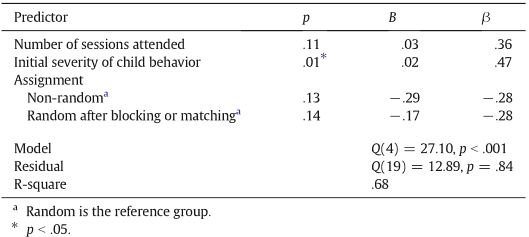Q2. What future works have the authors mentioned in the paper "Effectiveness of the incredible years parent training to modify disruptive and prosocial child behavior: a meta-analytic review" ?
Although this meta-analytic review addresses an important part of this chain, other parts were not examined and left open for further research. Nonetheless, the overall effectiveness of the IYPT regarding parenting behaviors and characteristics that influence its effectiveness regarding these parenting behaviors remain interesting questions for further research. However, individual mediation studies regarding the IYPT suggest that parenting domains such as critical, harsh parenting, inconsistent discipline, verbal criticism, positive parenting, responsive parenting, and stimulating parenting ( Beauchaine et al., 2005 ; Brotman et al., 2009 ; Fossum et al., 2009 ; Gardner et al., 2006, 2010 ; Letarte, Normandeau, & Allard, 2010 ; Posthumus et al., 2012 ), mediate outcomes. Furthermore, ample evidence for modifications in parenting behaviors can be found in individual IYPT studies.
Q3. What is the strongest predictor of the IYPT's intervention effects on parental report?
Pre-treatment intensity of children's problem behavior proved to be the strongest predictor of the IYPT's intervention effects on parental report, with larger effects for studies which included more severe cases.
Q4. What are the main family characteristics that may be associated with intervention outcomes?
The main family characteristics that may be associated with intervention outcomes are single parenthood, ethnic minority status, mother's level of education, and at-risk populations.
Q5. How many children are likely to be included in prevention studies?
for example, classroom-based components are likely to be added in prevention studies, which will include children with relatively few behavior problems.
Q6. What were the main factors that were negatively related to the study context?
study contextwas strongly negatively related to the family characteristics ethnic minority and at-risk (which were also highly interdependent).
Q7. How many studies have to exist to reduce the effect size for disruptive behavior?
Calculation of the failsafe number revealed that 1351 additional studies with nonsignificant or adverse results have to exist in order to reduce the overall effect size for disruptive behavior to a statistically non-significant overall effect, with a conventional significance level of .05.
Q8. Why was the addition of other components ignored in further analyses?
Because of the small set of studies that evaluated both additional IY components and additional other components, the addition of other components was ignored in further analyses, i.e. both categories were treated as IYPT + other IY components.
Q9. Why have effect sizes in evaluation studies been suggested?
Inflated effect sizes in developers' evaluation studies have been suggested (e.g., Eisner, 2009), because of developers' involvement and interests.
Q10. how many studies have to exist to reduce the effect size for parents?
Calculation of the fail-safe number revealed that 1207 additional studies with non-significant or adverse results have to exist in order to reduce the overall effect size for parents to a statistically non-significant overall effect.
Q11. How many studies have to exist to reduce the effect size for prosocial behavior?
Calculation of the fail-safe number revealed that 300 additional studies with non-significant or adverse results have to exist in order to reduce the overall effect size for prosocial behavior to a statistically non-significant effect.
Q12. how many studies have to exist to reduce the effect size for teacher report?
Calculation of the fail-safe number revealed that 71 additional studies with non-significant or adverse results have to exist in order to reduce the overall effect size for teacher report to a statistically non-significant overall effect.
Q13. What is the reason for the difference between parents and teachers' ratings?
Discrepancies between parents' and teacher's ratings are well-known, and may be caused by genuine contextual differences and more similarity in criteria as used by different teachers than in criteria as used by different parents (Scott, 2001), or insufficient generalization of the intervention effect from home to school settings.
Q14. What were the main variables that were excluded from further moderator analyses?
To control for these confounding variables in further moderator analyses, the authors first included initial severity of child behavior (whichwas also negatively related to minority and at-risk) in moderator analyses, and excluded problem and clinical symptom level.
Q15. What is the effective intervention method for pre-school and school-aged youth with antisocial?
Behavioral parent training (BPT) has been proven to be themost effective intervention method for pre-school and school-aged youth with antisocial behavior problems (McCart, Priester, Davies, & Azen, 2006).
Q16. What factors explained the variability in the IYPT's intervention outcomes?
Intervention characteristics, child characteristics, andmethodological features explained variability in parent-rated intervention outcomes of the IYPT.
Q17. Why are parents in treatment studies more likely to need help than in prevention studies?
parents in treatment studies are probably more in need of help than parents in prevention studies, because they typically seek help themselves (Mrazek & Haggerty, 1994).
Q18. How was the number of sessions attended by parents positively related to intervention effects?
the number of sessions attended by parents was positively related to intervention effects according to parents, even when initial severity of behavior was taken into account.



